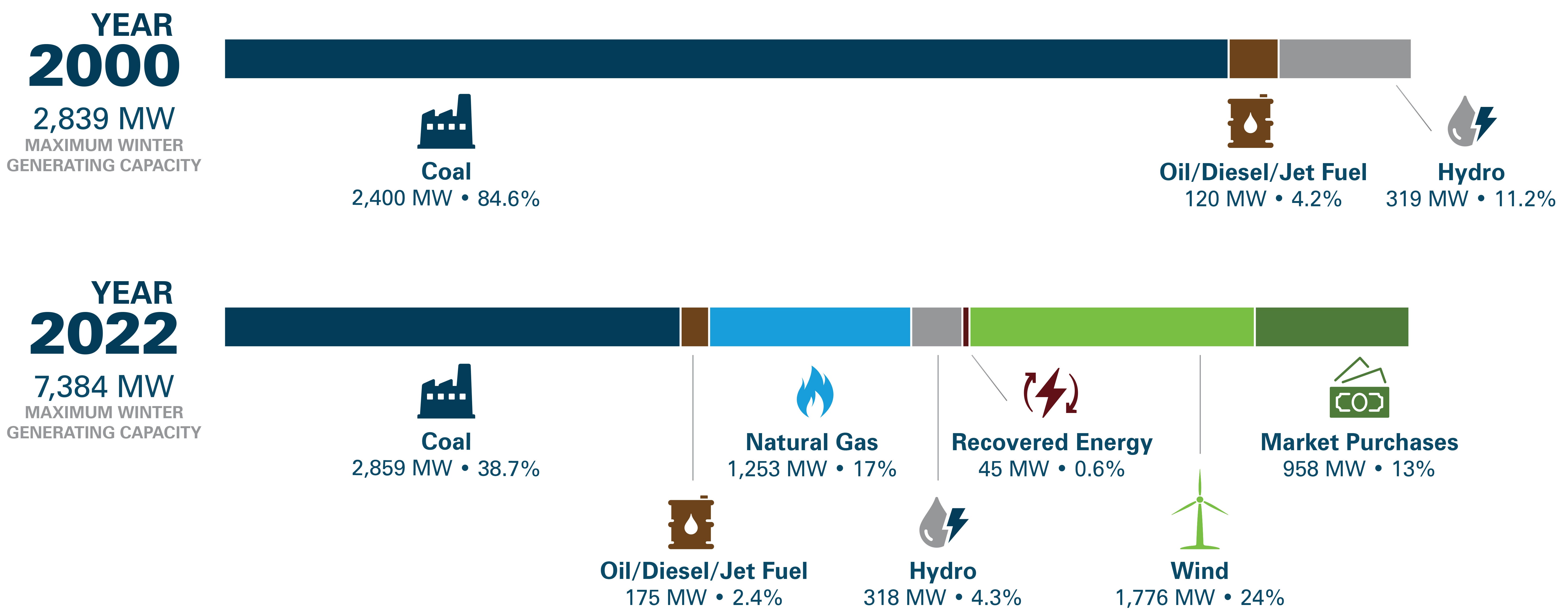A couple months ago, we experienced our first winter storm. Granted, getting snow in our part of the country in October is not out of the realm of possibilities. But I hoped we might have a warmer fall under the projected El Niño forecasted by the meteorologists. We all recognize the uncertainty of predicting Mother Nature. For the most part, we can adapt when we get it wrong, such as needing to wear a coat today.
Power Supply
Now, let’s have a similar discussion about the supply of electricity and the future trends of power supply. The utility industry has been on a path to improve the environmental footprint of power generation for well over a decade. This has predominantly been achieved through the introduction of larger scale wind and solar generation. As our industry adopts more wind and solar generation, our power supply becomes more dependent on Mother Nature. If the sun doesn’t shine or the wind doesn’t blow, the electricity doesn’t show up.
I personally am not a fan of relying on the weather forecast to determine what power I might have. That is why baseload generation is so important. Baseload generation, which is always available, is predictable and will be there when needed. New technology, such as batteries, to help fill the generation gaps are being developed, but are still a long way away to compensate for what core baseload generation provides today.
McKenzie Electric Cooperative (MEC) receives its power primarily from Basin Electric Power Cooperative (BEPC). I have provided an image from BEPC’s sustainability report, which shows the transition BEPC has undergone for a more diversified energy portfolio. In today’s utility landscape, we must have a well-rounded source of energy to be economical and dependable.

Regulations Risk Reliability
I would now like to turn to recently proposed regulations that threaten this balance of power sources and the need for a mindful transition as new technology develops and emerges.
In May, the Environmental Protection Agency (EPA) released a proposed update to the greenhouse gas emission requirements. Essentially, the proposed rule would require fossil fuel generation sources (coal and natural gas) to have provisions for carbon capture by 2030 or be significantly limited on the amount they can operate each year.
This proposed rule threatens the currently available baseload generation by imposing rules for new technology not commercially available, along with adding costly investments that do not produce more generation. When you couple this with the increase in demand on the electric system, a major storm is brewing. These changes in policy will put significantly more pressure on electric rates as the cost of replacement power becomes much greater.
So, what is MEC and the utility industry doing to stop this runaway train? Obviously, this issue is huge. MEC, along with numerous other utilities and entities, issued a specific letter to the EPA warning of the impacts these proposed regulations would have on the reliability and cost of energy.
Regional transmission organizations, such as the Southwest Power Pool, are changing their approach to ensure adequate value is placed on dispatchable generation. The North Dakota Transmission Authority is also actively engaged with various agencies, promoting sensible energy policy and assisting with means to support new transmission that would continue to improve reliability. The National Rural Electric Cooperative Association is also heavily involved in Washington, D.C., advocating for a sensible energy policy.
MEC focuses a lot of time on forecasting and studying the system and identifying the electric needs of the membership. An accurate load forecast is necessary, so the appropriate infrastructure can be constructed and so our power supplier can provide the needed energy to meet the future needs of the membership. Building electrical infrastructure takes a long time and having accurate forecasts helps mitigate delays and cost increases in meeting the future demand.
I agree environmental stewardship is necessary. However, a policy that overreaches the limitations of technology to promote a specific agenda has significant negative implications. We must slow the pace of transition or we will be risking the reliability and security of our bulk electric system.
A responsible power plan will ensure we all have the electricity we need at an affordable price and generated in an environmentally conscious manner. I hope this three-part series has provided a perspective on how complex it is to provide you the power on which you all rely, along with the pending threats and risks. I can assure you, your cooperative is well positioned to navigate these challenging times.
Please see the October and November issues of North Dakota Living to read parts one and two of this series.
